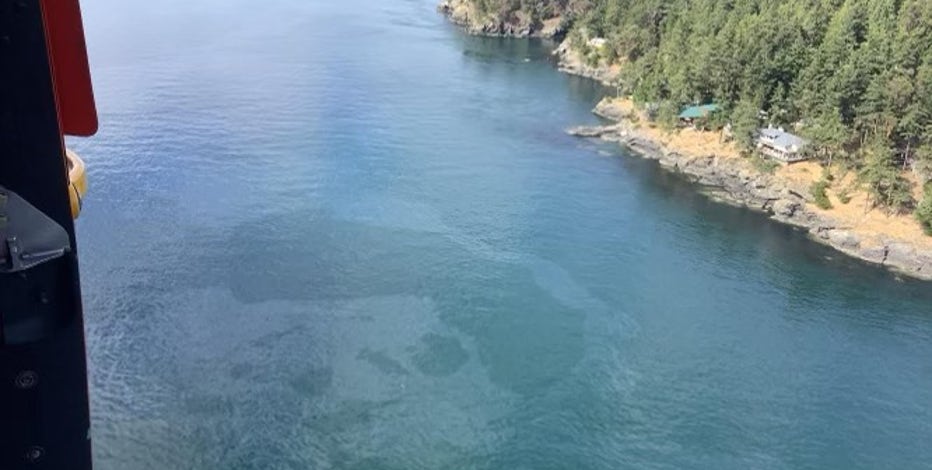Clean up efforts continue after diesel, oil spill near San Juan Island; scientists concerned about orcas
FRIDAY HARBOR, Wash. - It’s been nearly 36 hours since a fishing vessel sank off the west side of San Juan Island, and the fallout is still causing some concern.
All five crewmembers were rescued, but the deeper issue is the oil and diesel fuel that’s leaked from the ship. Initial estimates indicated that the Aleutian Isle fishing vessel went down with roughly 2,600 gallons of oil – most of that diesel fuel. The U.S. Coast Guard has noted that the ship is capable of holding up to 4,000 gallons of fuel, meaning it’s possible more fuel was on-board than the crewmembers estimated.
The larger question has become how the Southern Resident killer whales will be affected if they spend time in the water before the fuel is cleaned up, or dissipates.
On Saturday afternoon the orcas appeared to be heading toward the spill zone, before changing directions within a few miles. Early Sunday morning they moved out of the area, and haven’t returned.
Meanwhile, the cleanup continues. The initial estimate from the Coast Guard indicated the oil slick had extended nearly 2 miles, but by Sunday the slick was visible in various spots along the west side of the island – an area that covers nearly 10 miles.
The vessel is currently 100-plus feet under water off the area known as Sunset Point. Divers were brought in on Saturday night, but that work won’t continue until Monday morning when the unified command – made up of the U.S. Coast Guard, Washington State Dept. of Ecology, San Juan County Officer of Emergency Management and the Swinomish Tribe – can sign off on the plans.
Those divers are tasked with plugging any remaining leaks to stop additional oil from spilling into the water, before the vessel can be salvaged.
Featured
Scientists concerned about orcas after diesel, oil spill near San Juan Island
A fishing vessel sank off the west side of San Juan Island, which has locals on the island concerned.
As of Sunday, when FOX 13 News was able to make it out near the site of the sinking, only two boats were visible as the scent of diesel fuel still hung in the air.
"It’s scary because we know one catastrophic oil spill could spell the end of the Southern Residents," said Monika Wieland Shields, the founder of Orca Behavior Institute. "We’ve been talking about the threat of oils spills for years – so it’s very concerning and frustrating if we’re not prepared for something like this."
Shields, who studies the Southern Residents, told FOX 13 that it’s especially concerning given the amount of time and energy that’s gone into planning for worst case scenarios.
After the initial news broke on Saturday, she pointed out that nearly every single Southern Resident was near the island – making matters worse, they have no way to detect the spill.
If there’s a silver lining, it’s that the spill is diesel – a type of oil that can be difficult to collect once it’s spilled, but an oil that can evaporate in certain conditions.
The spill itself will kill plankton on contact according to Fred Felleman, a biologist and Seattle Port Commissioner who has worked on oil spills in the past. However, it typically won’t make its way through the entire food chain.
Asked about the scarcity of boats on the water, Felleman told FOX 13 that it’s an issue of what’s available and ready within the San Juan Islands immediate footprint. Despite a large economy, and serving as the primary habitat for a critically endangered species a number of necessary equipment isn’t available unless it’s shipped in.
"You can fly in a salvage master, but unless you have a vacuum truck a barge and things like that, that lives here you’re waiting two days," said Felleman. "And one of the best ways you can respond to an oil spill is to keep it from escaping."
Dr. Deborah Giles, with Wild Orca, took FOX 13 out on the water Sunday night for a closer look. Typically she is out on the water with her specially trained dog to collect orca scat for research – this week she’s preparing to use specialized tools to "haze" or re-direct any orcas that try to get closer to the spill site.
Giles called the spill a wake-up call.
"I’m one of those people that believes it’s not a matter of if, but when we’ll have a worse situation."
Giles said this isn’t practice, but it’s a real-life situation that should be used to push for better planning for future responses. In this situation, an absolute crisis was avoided – she’s all too aware of how close this one was.
"It’s nerve wracking that we have a boat go down," said Dr. Giles. "Thank goodness everyone is safe, but the fact we had a boat go down and the Southern Residents were inbound it was mind-boggling. That felt like worst case scenario yesterday."
While the team overseeing the clean-up will get increasingly busy on Monday, they’re also putting out a phone number for anyone who spots oiled wildlife: 1-800-22-BIRDS.
According to a local stranding group on San Juan Island, a dead harbor porpoise turned up on Sunday morning. It’s too early to tell whether it was affected by the spill. Locals have also reported a number of seals acting strange, but surveys of the spill are still just getting underway.
Moving forward a safety zone will be implemented to allow divers, and salvage teams, extra room to work on the clean-up. The Coast Guard told FOX 13 that some of the money for clean-up will be covered by the National Oil Spill Liability Trust fund that authorized $130,000 for spending during the initial spill response.


